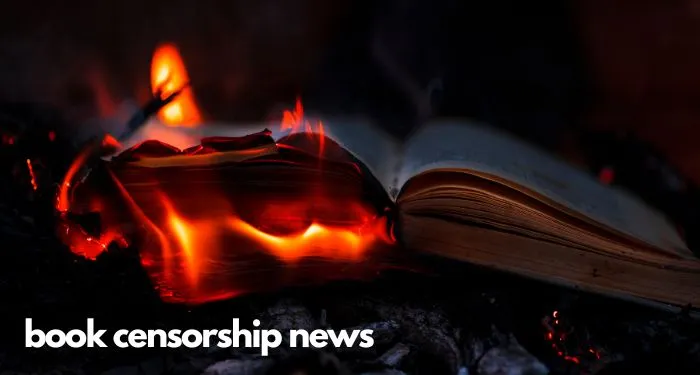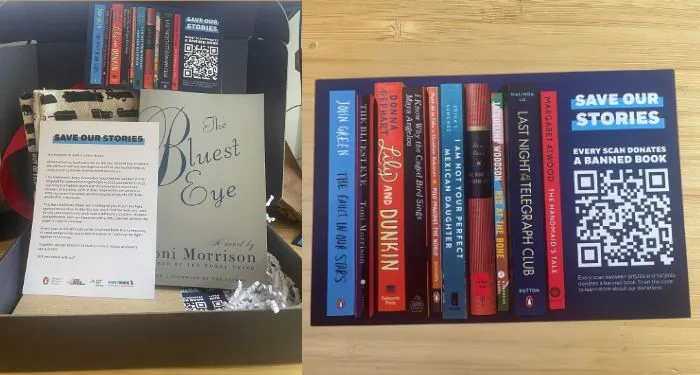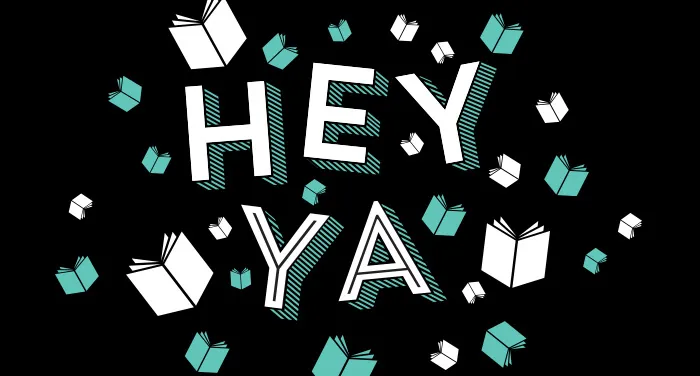
The ALA and PEN America Offer New Data on Recent Book Bans: Book Censorship News, September 27, 2024
Kelly Jensen is taking some much-deserved time off this week, so today, fellow editors Danika Ellis and Erica Ezeifedi are here to discuss some of the news coming out of Banned Books Week. We can’t cover it all, but we’ve each picked out a few of the biggest and most interesting stories to tell you about: Erica has the first three, and Danika wrote the last four.

The Save Our Stories Initiative Book Kit + a Hey YA Podcast Interview
Banned Books Week is winding down, but the Banned Wagon is still en route to its remaining seven destinations. If you’re unfamiliar, the Banned Wagon tour has been making stops at different libraries and bookstores across the Midwest and the South where communities have been hit hardest by book bans. There’s also the Save Our Stories donation initiative, which is expanding the Banned Wagon’s reach to locations not on the tour list.
Through the initiative, hundreds of bookstores and libraries across the country will receive a Save Our Stories box that includes resources to help fight book bans. I was sent one, and it had a copy of The Bluest Eye by Toni Morrison — one of the frequently banned books being given away free on the Banned Wagon tour — as well as a tote bag and fliers that have a QR code. Each scan the QR code gets between 9/15 and 10/31 results in one book being donated to communities impacted by book bans. So far, there have been 4,4435 scans/books donated.
Also make sure to catch the Hey YA episode that went live Wednesday, in which I speak with Caitlyn Colman-McGaw, Associate Director of Young Adult Programs and Services at the New York Public Library, about their Freedom to Read campaign.
Memo on School Book Bans from PEN America
PEN America’s preliminary findings show that, for the 2023-2024 school year, book bans are already more than double what they were last year. There were more than 10,000 instances of school book bans, up from last school year’s 3,362. Eight thousand of them come from Florida and Iowa because of state laws, and a lot of the increase comes from an enhanced focus on sexual content of any kind — which includes romance books, books about women’s sexuality, and books about sexual assault. Meanwhile, the focus on banning books about racism and LGBTQ+ characters remains.
But PEN America reckons their numbers are lower than reality, and emphasize the importance of keeping in mind soft censorship. Soft censorship includes hesitancy around certain books, the removal of books in the classroom, and even author visit cancellations.
American Library Association’s (ALA) 2024 Preliminary Book Ban Data
Interestingly, the American Library Association’s (ALA) preliminary data tells a bit of a different story, at least on the surface. Looking from January 1 to August 31, 2024, they count only 1,128 unique titles being challenged. Last year, unique challenges within the same time period amounted to 1,915. They do note that regardless of the difference in unique challenges, documented attempts of book banning are way higher than they were in 2020, and, like PEN America, they state the very real threat of soft censorship.
An important distinction to make when looking at PEN America’s and the ALA’s findings is that they seem to be showing us the state of censorship from two angles — the ALA is looking at unique titles being challenged, while PEN America is looking at total challenges. This is important to understand and state in case people think book banning is abating. It’s only amping up.
Wisconsin has Banned Wisconsin Books to Prisoners Donations
Kelly Jensen has been writing about prison book censorship all last week, and here’s another story: The Wisconsin Books to Prisoners program has been banned from donating books to Wisconsin prisons. And yes, the announcement came during Prison Banned Books Week. The Wisconsin Department of Corrections claims that this is to prevent people from pretending to be Wisconsin Books to Prisoners program in order to smuggle drugs into prisons inside of books, saying, “So our concern is not with your organization, but with those who would impersonate your organization for nefarious means.”
There’s no proof this has ever happened: the idea that books might be used to smuggle drugs has been a common talking point for prison book bans, without any evidence of it being a significant problem. WBTP offered to send tracking numbers for each donation to prove they were from their organization, but the DOC never replied.
Camy Matthay, cofounder of WBTP, says they’ve donated 70,000 books to Wisconsin prisons in the last 18 years, “all without a single instance of contraband,” and adds, “We don’t feel that it’s justifiable to, really, prohibit thousands of people in prison from reading material because of some bad actors.”
I highly recommend reading this whole article for a look into how arbitrary and confusing prison rules around book donations are and how ineffective they are in preventing drug overdoses — drugs are much more likely to arrive in prisons through staff than through the mail.
Llano County Lawyers Argue for Right to Ban Books By Claiming Libraries Are Government Speech
The Little v. Llano County case drags on. If you are following Literary Activism, you recognize Llano County: they’ve showed up countless times in roundups. Now, the Llano County lawyers are arguing in the Fifth Circuit Court of Appeals that book bans aren’t a First Amendment violation because libraries should be seen as government speech, which isn’t required to be neutral. They also argue that the 1995 Campbell v. St. Tammany Parish School Board decision, which ruled against book bans in public schools, should be overruled.
This argument has been tried before unsuccessfully, and if it was upheld, it would undermine cases going all the way back to 1939’s Miller, which defined what counts as obscenity. I appreciate the Eighth Circuit’s previous comment on this argument, which said that given that a “well-appointed school library could include copies of Plato’s The Republic, Machiavelli’s The Prince, Thomas Hobbes’s Leviathan, Karl Marx and Freidrich Engels’s Das Kapital, Adolph Hitler’s Mein Kampf, and Alexis de Tocqueville’s Democracy in America…if placing these books on the shelf of public school libraries constitutes government speech, the State ‘is babbling prodigiously and incoherently.'”
Check Out the Banned Together Auction!
Here’s a fun way to fight book bans. Celebrities from Daniel Radcliffe to Janelle Monáe have donated personalized books, meet-and-greets, and other prizes to Pride and Less Prejudice’s Banned Together auction, which raises money to send LGBTQ-inclusive books to classrooms across the United States.
The auction started yesterday and runs until September 29th. Items up for auction include a signed and personalized photo from Daniel Radcliffe, a copy of Memory Librarian personalized and signed by Janelle Monáe, vinyl of The Record by boygenius and a signed lithograph, a personalized video message from Lance Bass, a 30-minute virtual design consultation with Bobby Berk plus a signed and personalized copy of his book Right at Home, a signed and personalized Elvira “Coffin” table book, and so much more.
In addition to the celebrity donated items, there are also lots of other items, from chocolate bars to socks to Bookshop.org gift certificates, so even if none of those names are interesting to you, it’s worth checking it out!
…And More Book Banning News
There are a lot of stories about book bans and censorship coming out during Banned Books Week — too many to cover each in depth. So, here are a few other news stories worth clicking.
A group of Montgomery County parents are heading to Supreme Court to argue that they should be able to opt out of their children ever hearing about LGTBQIA+ people: they want to be able to exclude their children from any lessons involving books that include queer people. Hopefully, the Supreme Court will uphold that if you want to teach your kids to be bigots, you’ll have to teach them that at home.
As Kelly Jensen has talked about so many times before, teachers and librarians are self-censoring in the face of book bans. This has the same effect as book bans, but it usually leaves no trace, so it’s impossible to know just how many books — especially LGBTQIA+ books, BIPOC books, and books about “tough topics” like addiction and sex education — have quietly been prevented from reaching the readers who most need them.
LeVar Burton joined Stacey Abrams on her podcast to discuss how to fight book bans.
During Banned Books Week, Powell’s Books is donating 20% of sales from its Banned Books list to American Booksellers for Free Expression to fund lawsuits against book bans. This is a nice way to make Banned Books Week displays actually useful in the fight against censorship.
The Los Angeles Public Library and LAX are teaming up to offer travelers access to banned books at the airport by issuing temporary library cards via QR code. They’ll give you access to banned books like The Bluest Eye and Let’s Talk about It: The Teen’s Guide to Sex, Relationships and Being a Human.
If you’re reading this newsletter online and want book censorship news in your inbox, sign up for Literary Activism here.














